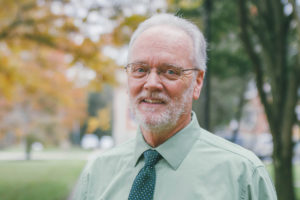This spring, Houghton College will bid farewell to a number of retiring professors. These retirees include Carlton Fisher of the philosophy department, art professor Gary Baxter, Ronald Oakerson from the political science faculty, Linda Mills Woolsey of the English department, Judy Congden of organ and harpsichord and writing and literature professor James Zoller. After teaching generations of students, these professors shared some reflections on their experiences at Houghton College.
Linda Mills Woolsey began teaching at Houghton in 1999 and was already familiar with the institution, since both she and her husband, Dr. Stephen Woolsey, are Houghton alumni. Houghton’s commitment to learning influenced Mills Woolsey’s career as she explained, “Teaching undergraduates challenges you to keep alive intellectually, to keep growing and changing yourself, so what you offer your students is not stale, yesterday’s thinking. And it’s a good challenge because you wouldn’t want to just get stale.”

Not planning to grow stale in retirement, Mills Woolsey anticipates “the freedom to pursue some new projects and maybe learn some new things. I hope to pursue some hobbies like drawing and painting and maybe doing some volunteer work.” With all these new possibilities, she remarked with a smile, “I will not miss grading papers.”
However, Mills Woolsey expects that in her transition from Houghton she will miss “the interaction with the students without a doubt.” Mills Woolsey hopes “to be remembered as a challenging teacher but one who cares about students and tries to be fair to people, meeting them where they are.”
Likewise, Gary Baxter plans to be active in retirement. He looks forward to the opportunity “to visit family and explore this planet.” Beginning his Houghton career in 1979, Baxter has watched the evolution of his field of expertise in ceramics. He observed, “Critiques, which I believe are the essence of teaching art, used to be very difficult, yet now they are even harder with so much more information, unlimited processes and their new media, cutting edge art that has dulled in some cases, and the technology revolution.”
Despite these challenges, Baxter has continued to instruct countless students as well as to hone his own skills by annually creating a new work for the faculty art show. Over his years at Houghton, Baxter has especially enjoyed “watching students discovering and using their gifts.” He hopes to be remembered as “someone who gave himself to the students by making a serious art space where serious students could make serious work.”
Since arriving at Houghton in 1984, James Zoller has appreciated “that I can read what and as I want and then that I can shape that reading into courses that require me and students to figure out how to handle it, to determine what matters and how.” Also, Zoller values his interactions with students and faculty at Houghton. As he stated, “I have many friends here.”
In retirement, Zoller expressed that he is “looking forward to the absence of a rigid teaching schedule” which he hopes will enable him to travel and “to write new things and to pull together some of my unpublished stories, poems, articles, et cetera, into book form.” While he enjoys more freedom in his schedule, Zoller would like to be remembered “as a teacher who kept learning and who kept his attention on how his subjects and activities might improve us all as human beings.” He explained, “I think God is honored as much by how we handle our responsibilities and how we treat the people we have contact with as by how much we talk about Him.”
A life-long Wesleyan whose maternal grandparents met at Houghton College, Carlton Fisher joined Houghton in 1985. Contemplating his career, Fisher noted that “as I have become more and more comfortable in the classroom, teaching becomes more and more enjoyable.” His pleasure in teaching at Houghton has come in many forms, including “listening to myself talk,” “those relationships with a few students that happen and are very fulfilling,” and “lunches with Eckley and Oakerson.”
On the other hand, Fisher expects to find joy in retirement. He is especially eager for a closer “proximity to my grandsons. And just the excitement of newness. We plan to relocate, so there’s a bit of adventure about it which comes with a sort of uncertainty, too, about how much I will enjoy it. It’s kind of like a senior getting ready to graduate.”
As he “graduates” from teaching at Houghton, Fisher explains that for “students who have had me as a professor over the years, what I hope is that I will have said at least one thing that proved to be helpful.” Regardless of how he is remembered, however, Fisher can ultimately conclude that his Houghton career was “fun. It’s a great way to be able to spend your life doing something that you really enjoy doing.”
